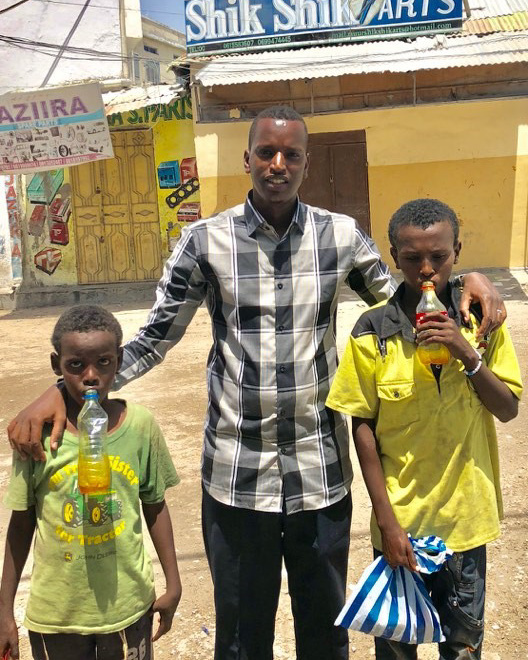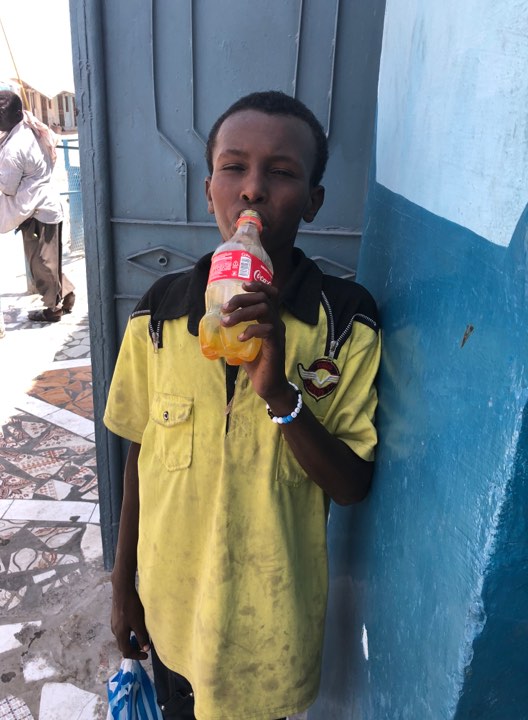The misery of glue sniffing among streets children in Mogadishu


By Isak Abdi Abdullahi
As you walk along the streets of Mogadishu particularly Kilometer 4 area, you are struck by a sickening sight you only wish you could step in and offer a hand of help. The misery that now defines these streets leave you with only two options-either you graciously step in to help or you walk away making sure your mobile phone is out of their sight.
While on the streets you see the smiles on the faces of some that choose to see the light in the darkest of days, but there are many that can’t do the same. Unable to afford the kind of escapes we find, they resort to the only thing that they can afford-glue.
Young and unable to change the circumstances that they have been born into, street children in Mogadishu spend no less than seven thousand of Somali shillings which is equivalent to less than USD 0.5 Dollar on koolo and spread it across a piece of cloth, which they then sniff to get ‘high’. Children on the street claim that this disables their bodily functions as they no longer feel vital feelings like pain and hunger. They fall asleep without care only to wake up to another rough day. No one blinks an eye when you buy koolo from any shop in Mogadishu.
However, my short encounter with these two male teenagers sticks in my mind more than any other, as I had never seen fresh young faces heavily under the influence of such a toxic substance. The glue is locally called koolo and is typically used for shoe repairs. Its harmful constituent is toluene, a substance that is severely restricted in most of the world and yet is still imported into Somalia, despite its widely known effects of brain damage, paralysis, kidney and liver failure, and, eventually, death.

The two boys each clutching a bottle of koolo represent only a small percentage of the glue-sniffing street children that wander the streets of Mogadishu day and night. The boys I met ranged in age from 10-16 years and yet all displayed a maturity well beyond their age. Through our conversation, they were sniffing dendrite glue put inside plastic bag to get away from hunger, worries, tensions and problems.
MUGGING
There has been an upsurge of mugging and snatching incidents in Mogadishu’s KM4 Area. Muggers walk in groups of between two and four people attacking pedestrians during day time. They also snatch even earrings from female pedestrians with impunity leaving some of them with serious injuries. Snatching of mobile phones and handbags has become the order of the day at the busy Maka Almukara roundabout especially during rush hour. The criminals take advantage of traffic build-up to snatch the items. Most of the commuters who fall prey are the ones who sit by the vehicles’ windows.
While having a cup of coffee with some of my friends one afternoon at a coffee shop near KM4 junction, a young rugged man approached us, and suddenly a gentleman sitting by me stood up for the boy as a sign of respect and hugged him. They exchanged few words and the boy left. With curiosity I asked the gentleman about the boy and the reason behind his respect. To my surprise, the gentleman told me that the man used to be one of the best Mogadishu transport drivers in between 2010 and 2014. But he is now down with koolo.
SECURITY MEASURES
Often victims are approached from behind while talking or texting on phones. While most incidents happen between 8:30 AM and 7:00 PM at night, criminals operate during the day as well so always look out for what’s going on around you. Follow these simple steps to help protect your phone:
– If you need to call or use your phone on the street particularly KM4 area, look out for anyone near you and make it quick so you don’t become distracted.
– Don’t text while you’re walking – you won’t notice what’s going on around you and if that’s not possible, stand away from the roadside close to a building or wall so no one can come up from behind you. Also going hands free can prevent a thief from snatching your phone out of your hand.
Most of the street children in Somalia are boys but that does not mean girls are not homeless. According to UNICEF, approximately 72% of street children are aged between 6-12 years and 13% are below 6 years of age.“ Almost all the studies and surveys on street children points out that problem of street children is an urban problem and directly linked to poverty, family disintegration, urbanization, inadequacy of resources and growing population.
SLOW DEATH
Majority of us are blessed because when we return home from offices, and schools and there is a family waiting for us which takes away our exhaustion. But all are not that fortunate. Many children in Somalia specially those who live in the capital city of Somalia are deprived off this feeling of family and home.
What they don’t know is that sniffing glue is a slow death for them. They don’t know that it is slowly killing them by depressing their nervous system to the point their organs fail one by one. A UNICEF study has also indicated 5,000 children in Somalia are suffering from this habit, at this very moment, but sadly there is no law in Somalia preventing glue sniffing.
In order to support these street children here in Mogadishu, an increase in awareness and prevention programmes is necessary from either the government, private sector or NGOs. Without the right help, we can only imagine how many more young children will be lost to drug abuse and crime in the future in Mogadishu and indeed in other parts of Somalia.
The author is a writer on social issues and can be reached via: [email protected]